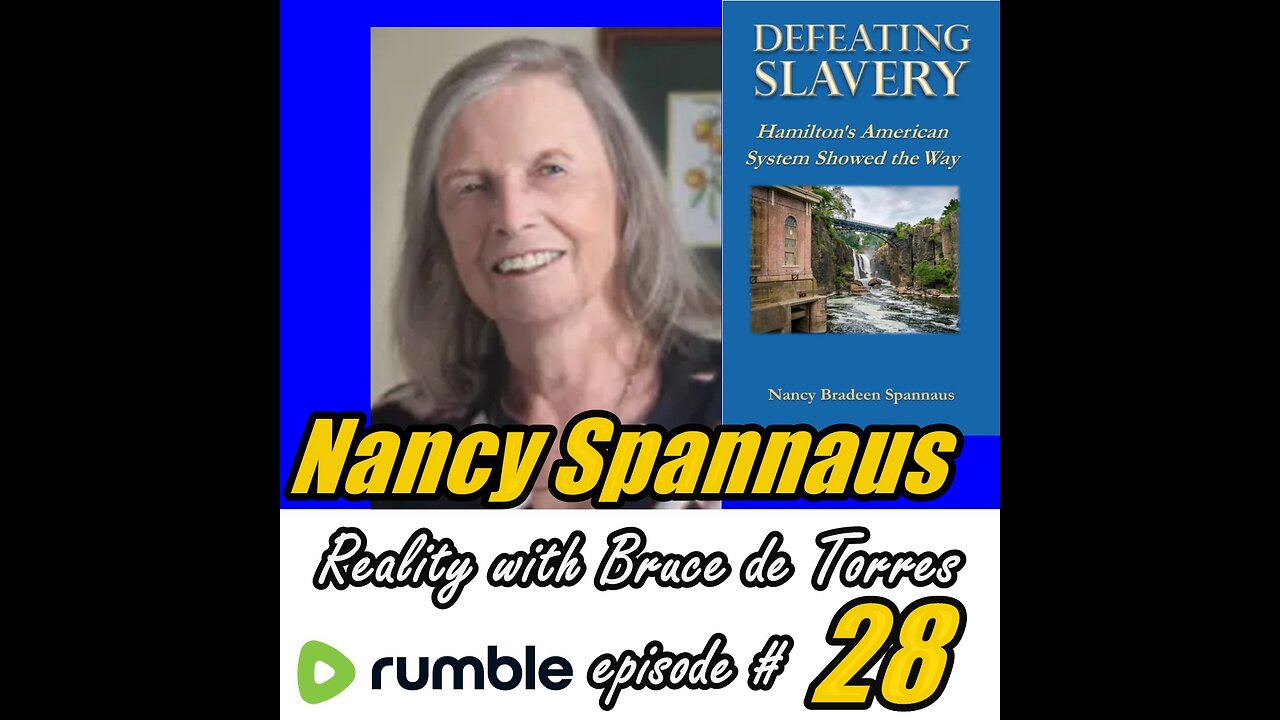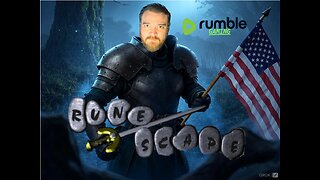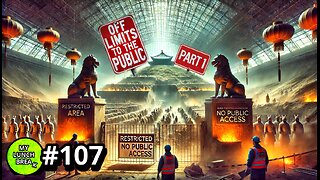Premium Only Content

Reality with Bruce de Torres 28 Nancy Spannaus
Reality with Bruce de Torres 28 Nancy Spannaus
Nancy Bradeen Spannaus has been studying American history for fifty years. She discusses her latest book, DEFEATING SLAVERY: Hamilton’s American System Showed the Way, written in part because she felt THE 1619 PROJECT of the New York Times was way off base with the idea that the arrival of slaves was the founding of the country.
Some highlights of our conversation:
We still have a big problem with race in this country. That must be acknowledged, and we must look where that came from and get our history straight in order to deal with it.
She also wanted to refute the attacks on Hamilton claiming that he was an enslaver.
We had the strongest anti-slavery movement in the world at the time of the American Revolution and immediately thereafter. Info and excerpts in her book show that.
Race became a question as a result of people who wanted to stay on top economically. For example, Virginia didn’t have public schools until 1870. The plantation class didn’t want educated blacks and they didn’t want educated whites. They didn’t want to spend the money on it (and didn’t want an uprising of people who wanted to change the entrenched economic system of the South).
Hamilton’s economics – ignored, maligned, misrepresented – served America’s ideals (all men are created equal and are endowed with certain inalienable rights … life, liberty, and the pursuit of happiness) and let the federal government serve mankind’s quest for self-improvement.
Hamilton’s system would end slavery by letting us industrialize and leave the British system of merely supplying raw materials to the Empire.
Unfortunately, his industrialization program was sabotaged by the Jeffersonians who were elected in 1800. They became a combination of the South’s slavocracy and northern bankers and merchants who prospered by selling exports (cotton, prominently) to England, setting the nation irrevocably on course to the Civil War by 1833.
Jefferson repudiated government credit for manufacturing and investment in infrastructure intended to connect all the states through commerce (which would threaten the slave economy) and cut taxes until the military was at the mercy of even pirates in the Mediterranean.
The War of 1812 showed the weaknesses of Jefferson’s repudiation of Hamilton’s economics. The roads being unimproved, we couldn’t move troops from one place to another. We didn’t have supplies. We didn’t have the industries. Most of our gunpowder still came from Britain, even though we were in a war with them.
John Quincy Adams tried to put us back on track during his one-term presidency. Then Andrew Jackson became president in 1829 and he was basically a tool of that alliance between the New York banking-merchant group and the Richmond slavocracy, which served the British Empire’s colonial exploitation of the raw materials of other nations.
The British explicitly said all the way through this period that they were out to sabotage our having a manufacturing capability. “Stifle the manufacturers in the cradle,” said a member of the House of Lords in 1816. And you can find the same thing up to the Civil War.
People must understand the difference between having a financial system that promotes economic growth and individual flourishing versus a system of oppression, slavery and other kinds as well.
Can we create a society where the good of the individual is coherent with what’s good for the nation? Nancy believes that’s possible and necessary but a lot of people don’t because they see that it relies on having good people in office and they doubt that can be accomplished or sustained.
We’ve got to educate or re-educate people about these questions and get them to think deeply about them and not only have emotional reactions to what is going on.
Lincoln, in the chaos of the 1830s, ‘40’s and ‘50s, pondered these questions and seeing the erosion of our structure, particularly our Constitution, asked, “Are we going to lose the Republic?” He said, “What we need is reason. Cold, calculating reason.” Meaning, we’ve got to cultivate the ability to think things through and not simply have an emotional reaction.
That’s very difficult for people now, especially when a short attention span is what’s encouraged or adapted to.
The extraordinary statesmanship of President John F. Kennedy. How he and Lincoln always had a book, were always trying to learn.
Nancy also co-wrote THE POLITICAL ECONOMY OF THE AMERICAN REVOLUTION and wrote HAMILTON VERSUS WALL STREET: The Core Principles of the American System of Economics.
Nancy is a graduate of Bryn Mawr College and Columbia University and a member of The Daughters of the American Revolution. Learn more at her site, americansystemnow.com.
-
 51:43
51:43
Reality with Bruce de Torres
3 months agoRWB 40 David Meiswinkle
1932 -
 19:57
19:57
BlackDiamondGunsandGear
3 days agoIS 22LR ENOUGH?
29K12 -
 1:59:47
1:59:47
Anthony Rogers
19 hours agoLIVE Comedy @ Cusumano's Pizza (Upstairs)
14.4K1 -
 5:02:46
5:02:46
MoFio23!
17 hours agoNintendo Switch It UP Saturdays with The Fellas: LIVE - Episode #1
99K14 -
 4:26:49
4:26:49
BLoobsGaming
16 hours agoCan I get an Enhance Crystal Weapon Seed please!? MORE Corrupted Gauntlet
147K42 -
 7:35:05
7:35:05
BSparksGaming
1 day agoDynamic Duo! Marvel Rivals w/ Chili XDD
93.8K -
 7:00:42
7:00:42
NellieBean
18 hours ago🔴 LIVE - trying some COD maybe Pals later
92.4K1 -
 1:47:46
1:47:46
SpartakusLIVE
16 hours agoThe Master RIZZLER has entered the building, the 95% REJOICE
45.7K3 -
 29:53
29:53
MYLUNCHBREAK CHANNEL PAGE
1 day agoOff Limits to the Public - Pt 1
107K188 -
 16:03
16:03
Tundra Tactical
18 hours ago $21.71 earnedNew Age Gun Fudds
159K20